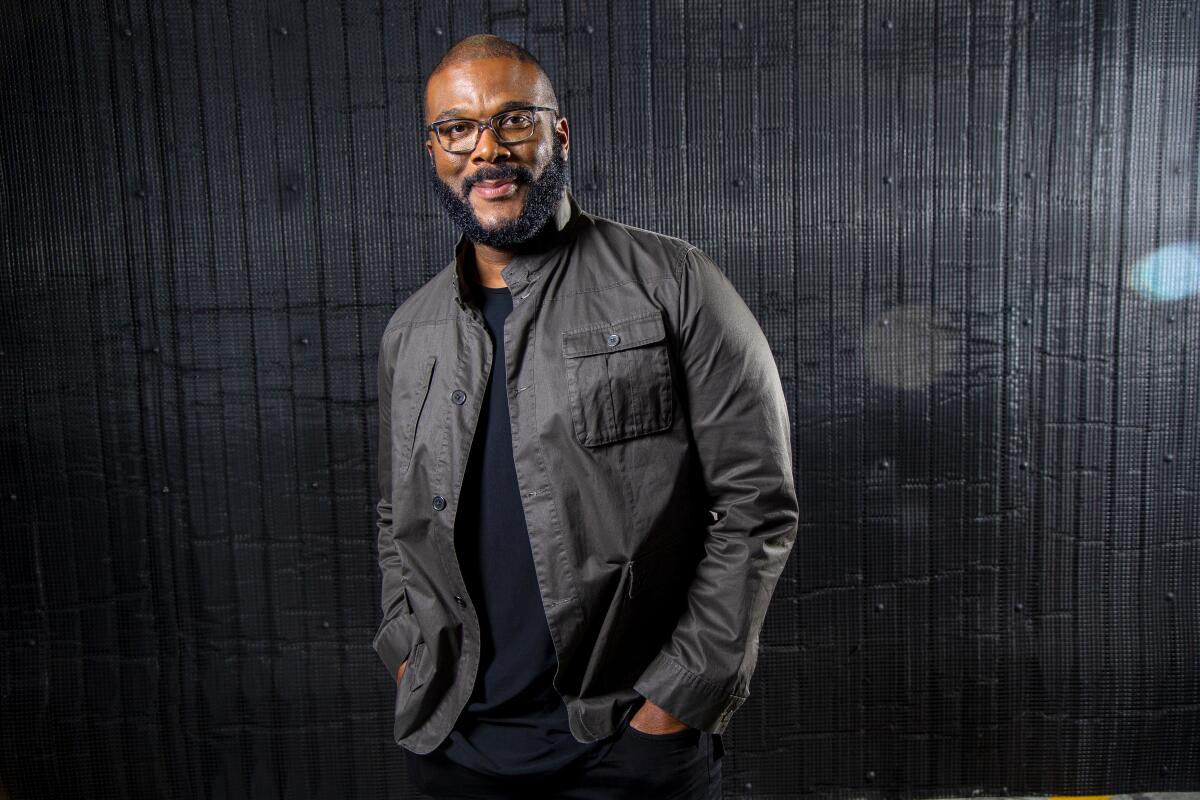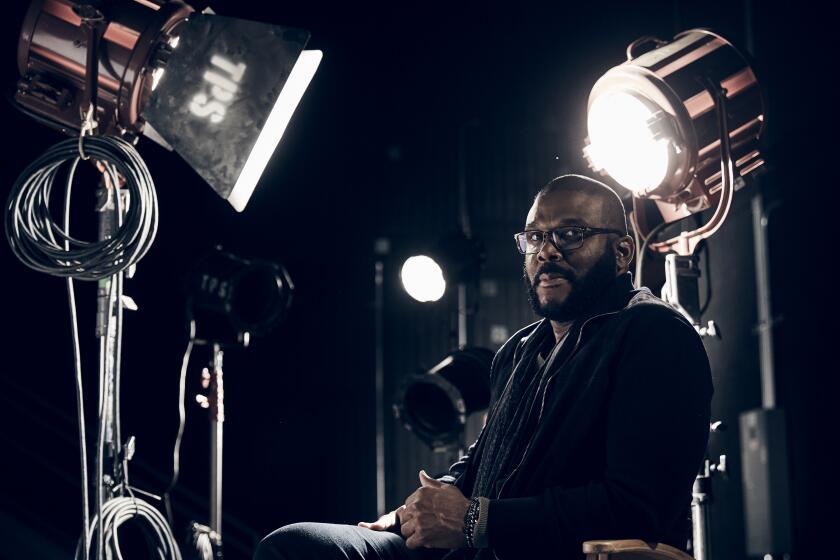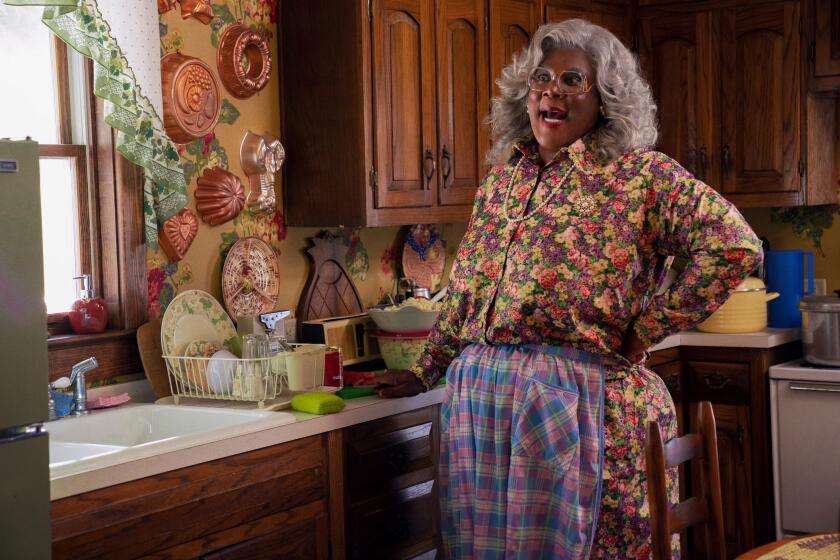Tyler Perry calls out ‘highbrow’ critics, defends his fans: ‘Don’t discount these people’

- Share via
Tyler Perry’s last feature film earned a rare 0% on Rotten Tomatoes — a point that’s apparently of little concern to him.
The billionaire filmmaker, best known for his franchise character Madea, is far more interested in the opinions of his fans than those of “highbrow” critics, he said on the “Baby, This is Keke Palmer” podcast.
“For everyone who is a critic,” Perry said in the Tuesday episode, “I have thousands of — used to be — emails from people saying: ‘This changed my life. Oh, my God, you know me. Oh, my God, you saw me. How did you know this about my life and my family?’ So that is what is important.”
The prolific, wildly successful Tyler Perry wrote historical drama “A Jazzman’s Blues” in 1995. It finally world premieres at 2022 Toronto film festival.
Critiques of Perry and his purportedly flat depictions of Black characters date back to his early directing days. Spike Lee, for one, in 2009 famously alluded to Perry’s work while complaining about the “buffoonery” in Black comedy. More recently, playwright Michael R. Jackson took his turn swinging at the movie mogul in his metafictional musical “A Strange Loop.”
In the number “Tyler Perry Writes Real Life,” Jackson’s protagonist — a Broadway usher who dreams of being a writer — denounces Perry’s oeuvre: “The crap he puts on stage, film and TV / Makes my bile want to rise!”
The song wasn’t born of any “personal vendetta,” Jackson told Washington Post Live in 2022. “It’s really about actually taking Tyler Perry’s work very seriously, because it’s often held up, often by Black communities, as sort of, like, the end-all-be-all of what one can do as a Black artist.”
“I just wanted to sort of problematize that and satirize that,” he said.
Upon Palmer referencing Jackson’s musical jab, Perry told the podcast host, “I know for a fact that what I’m doing is exactly what I’m supposed to be doing.”
When it comes to critics in general, he continued, it’s best to “drown all that out.”
“We’re talking [about] a large portion of my fans who are disenfranchised, who cannot get in the Volvo and go to therapy on the weekend,” he said. “So you’ve got this [Black critic] who is all up in the air with his nose up looking at everything, and then you’ve got people like where I come from, and me, who are grinders, who really know what it’s like, whose mothers were caregivers for white kids, and were maids and housekeepers.”
He added: “Don’t discount these people and say that their stories don’t matter. Who are you to be able to say which Black story is important or should be told? Get out of here with that bull-.”
Corey Hardict, who co-stars in Perry’s latest film “Divorce in the Black,” last week invoked a similar defense for the critical bomb: “I mean, the people love the movie and we do it for the people — that’s who I do it for. If the culture’s rocking with it, it’s all love. So it’s fine.”
The media mogul is rumored to be acquiring VH1 and BET. He can thank his female stage persona for the wealth that makes that possible.
Perry’s podcast comments have already garnered backlash online, with Preston Mitchum of the reality show “Summer House: Martha’s Vineyard” writing Wednesday on X, “Yes, because writing and producing a movie where a Black woman from a small town cheated on her husband, acquired HIV, then ended up physically disabled is absolutely the groundbreaking Black story we need to see.”
Mitchum’s post seemingly refers to Perry’s 2013 film, “Temptation: Confessions of a Marriage Counselor.”
Palmer defended Perry against other disparagers online, writing Wednesday on X, “The enemy isn’t Tyler it’s the system that makes it hard for multiple black artist[s] to shine at one time.”
“Tyler is not the gatekeeper of all black stories he’s just one creative who broke through the system,” she wrote. “Advocating for others to do the same is the fight, not hating Tyler for his work that many do love.”
Perry in 2019 celebrated the grand opening of his 330-acre Tyler Perry Studios in Atlanta. He created the complex with the hope of promoting cultural diversity in the film industry, he told The Times in 2016.
“Sometimes I drive around here by myself and think, ‘Is this too much, or is this what I’m supposed to do?’ ” Perry said. “The answer is obvious. When this fell into my lap, I said, ‘I have to do this.’ This is the endgame.”
More to Read
Only good movies
Get the Indie Focus newsletter, Mark Olsen's weekly guide to the world of cinema.
You may occasionally receive promotional content from the Los Angeles Times.













